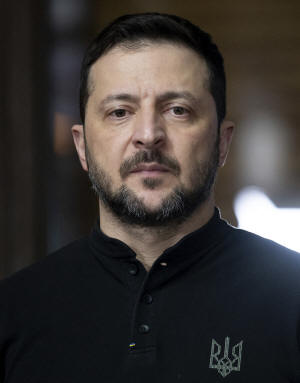US presented Ukraine with a document to access its minerals but offered
almost nothing in return
 Send a link to a friend
Send a link to a friend
 [February 17, 2025]
By EMMA BURROWS [February 17, 2025]
By EMMA BURROWS
MUNICH (AP) — Ukrainian President Volodymyr Zelenskyy says he directed
his ministers not to sign off on a proposed agreement to give the United
States access to Ukraine’s rare earth minerals because the document was
too focused on U.S. interests.
The proposal, which was a key part of Zelenskyy’s talks with U.S. Vice
President JD Vance on the sidelines of the Munich Security Conference on
Friday, did not offer any specific security guarantees in return,
according to one current and one former senior Ukrainian official
familiar with the talks.
Zelenskyy’s decision not to accept the proposal, at least for now, was
described as “short-sighted” by a senior White House official.
“I didn’t let the ministers sign a relevant agreement because in my view
it is not ready to protect us, our interest,” Zelenskyy told The
Associated Press on Saturday in Munich.
The proposal focused on how the U.S. could use Kyiv’s rare earth
minerals “as compensation” for support already given to Ukraine by the
Biden administration and as payment for future aid, the current and
former senior Ukrainian officials said, speaking anonymously so they
could speak freely.
Zelenskyy insists on security guarantees
Ukraine has vast reserves of critical minerals that are used in the
aerospace, defense and nuclear industries. The Trump administration has
indicated it is interested in accessing them to reduce dependence on
China but Zelenskyy said any exploitation would need to be tied to
security guarantees for Ukraine that would deter future Russian
aggression.
“For me is very important the connection between some kind of security
guarantees and some kind of investment,” the Ukrainian president told
AP.
Zelenskyy did not go into details about why he instructed his officials
not to sign the document, which was given to Ukrainian officials on
Wednesday by U.S. Treasury Secretary Scott Bassent on a visit to Kyiv.

“It’s a colonial agreement and Zelenskyy cannot sign it,” the former
senior official said.
White House National Security Council spokesman Brian Hughes did not
explicitly confirm the offer, but said in a statement that “President
Zelenskyy is being short-sighted about the excellent opportunity the
Trump administration has presented to Ukraine.”
The Trump administration has grown weary of sending additional U.S. aid
to Ukraine and Hughes said a minerals deal would allow American
taxpayers to “recoup” money sent to Kyiv, while growing Ukraine’s
economy.
Hughes added that the White House believes “binding economic ties with
the United States will be the best guarantee against future aggression
and an integral part of lasting peace.” He added: “The U.S. recognizes
this, the Russians recognize this, and the Ukrainians must recognize
this.”
Ukrainians worry about securing mineral sites from Russian attacks
U.S. officials in discussions with their Ukrainian counterparts in
Munich were commercially minded and largely concentrated on the
specifics of exploring the minerals and how to form a possible
partnership to do that with Ukraine, the senior official said.
[to top of second column]
|

Ukraine's President Volodymyr Zelenskyy, arrives for talks with
Germany's Chancellor Olaf Scholz, at the Munich Security Conference,
in Munich, Germany, Saturday, Feb.15, 2025. (Sven Hoppe/DPA via AP,
Pool)

The potential value of the deposits in Ukraine has not yet been
discussed, with much unexplored or close to the front line.
The U.S. proposal apparently did not take into account how the
deposits would be secured in the event of continuing Russian
aggression. The official suggested the U.S. did not have “ready
answers,” to that question and that one of their takeaways from
discussions in Munich will be how to secure any mineral extraction
operation in Ukraine involving people and infrastructure.
Any deal must be in accordance with Ukrainian law and acceptable to
the Ukrainian people, the senior Ukrainian official said.
“Subsoil belongs to Ukrainians under the constitution,” Kseniiia
Orynchak, founder of the National Association of Mining Industry of
Ukraine, previously told the AP, suggesting a deal would need
popular support.
Zelenskyy and Vance did not discuss the details of the U.S. document
during their meeting Friday at the Munich conference, the senior
official said. That meeting was “very good” and “substantive,” with
Vance making it clear his and Trump’s main goal was to achieve a
durable, lasting peace, the senior official said.
Zelenskyy told Vance that real peace requires Ukraine to be in a
“strong position” when starting negotiations, stressed that the U.S
negotiators should come to Ukraine, and that the U.S., Ukraine and
Europe must be at the negotiating table for talks with Russia.
No Europeans at the negotiating table?
But Gen. Keith Kellogg, Trump’s special envoy for Ukraine and
Russia, all but cut Europeans out of any Ukraine-Russia talks,
despite Zelenskyy’s request.
“You can have the Ukrainians, the Russians, and clearly the
Americans at the table talking,” Kellogg said at an event hosted by
a Ukrainian tycoon at the Munich conference. Pressed on whether that
meant Europeans won’t be included, he said: “I’m a school of
realism. I think that’s not going to happen.”
Ukraine is now preparing a “counter proposal” which will be
delivered to the U.S. in “the near future,” the official said.
“I think it’s important that the vice president understood me that
if we want to sign something, we have to understand that it will
work,” Zelenskyy told the AP.
That means, he said, “it will bring money and security.”
___
Associated Press writers Aamer Madhani in Washington and Volodymyr
Yurchuk and Susie Blann in Kyiv, Ukraine, contributed to this
report.
All contents © copyright 2025 Associated Press. All rights reserved |